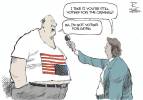ESSAY CONTEST: BATTLING THE CENSOR
We as a species have progressed — to put it lightly — considerably since humanity’s distant ancestors coalesced in the primordial soup. But in many respects we have yet to fully discard our more primitive selves, and buried deep in every person’s brain is the Neanderthal urge to destroy that which is alien or confusing.
So much effort has been invested into civilizing ourselves that it can be hard to see this destructive impulse taking on new forms — and indeed, in the name of civility, people have taken again to destruction. This destruction is far more subtle than the caveman who bashes a mammoth to death with a club; yet it has wrought far more damage than a caveman ever could.
The destructive force I speak of is censorship, and through this malignant process hundreds of thousands of artworks have met a grisly end. But it is more than art being destroyed when the censor goes to work: it is also the artists’ ability to express themselves.
No society can continue forward without a constant influx of new ideas, even bad ideas, because a dearth of creativity translates into stagnation. Whole empires have been erased from the pages of history due to stagnation, and while the fall of our own civilization can’t come from an act so simple as censoring music, it is certainly a baby step into territory we must avoid.
There are many ways one might attempt to justify censoring music that features violent themes. For example, some have claimed that such music is a natural progenitor of youth violence — and yet this is simple moral panic at work. The argument has existed, without merit, for literally centuries — the Salem witch trials were started in part because three girls danced to a slave’s native music, igniting fears of witchcraft.
Beyond this, even a cursory view of crime statistics reveals a startling trend: Youth crime in America is at an all-time per-capita low since statistics were first collected. The per-capita ownership of music and music devices is also at an all-time high thanks to the Internet. One might even say that real-life violence is inversely proportional to violent music — but then that statement would be as patently fallacious as the opposite claim is.
Another justification for censorship is that music can act as an agent for transmitting and upholding stereotypes or otherwise malicious ideas. It is true that many hate groups use music to rally their members, and in the mainstream themes such as misogyny run rampant in lyrics. That these pieces of music are unpleasant is indisputable.
But the cultural values they support are the real societal ill here — and addressing only this one symptom of a far greater illness would be akin to focusing on curing a headache caused by Ebola. Censoring music to stop the spread of certain “evil” ideas does nothing to stop those ideas, and worse, it sets a dangerous precedent which allows for the censorship of any artwork based on the popularity of its message.
In enjoying a piece of music, there seems to be an assumption that the listener must be tacitly agreeing with what the music is communicating. And this is what the issue really comes down to in the end. The assumption here stems from the common conception that the underlying message of a set of lyrics can be objectively ascertained. But that is not so, because like any form of art, the entire purpose of music is to allow the audience to find their own interpretations.
A given piece of art might have a specific meaning that the artist is attempting to express, but even the artist’s interpretation of his own piece cannot be considered objective, just as one’s own thoughts do not contain an inherent objective meaning. It may be hard to come away from a song like “Cop Killa” with more than a couple of different interpretations, but even the simplest music is leagues more complex than everyday speech.
Without the wide array of ideas available through music and other art, it is very easy to imagine society as a narrow-minded dystopia populated by people who, like a caveman cowering from fire, avoid that which will empower them in trying to avoid that which might hurt them.
Thomas Fadigan will be a senior this fall at Cimarron-Memorial High School.
ESSAY WINNERThomas Fadigan of Cimarron-Memorial High School is the most recent winner of the Review-Journal’s high school essay contest. His composition was selected from more than 50 entrants which addressed the topic, “Should singers of rock, hip-hop and pop music be prohibited from using lyrics that are racist, misogynist or glorify violence?” Mr. Fadigan will receive a $200 prize. The runner-up, John T. Schoeman of Palo Verde High School, will receive $50.


















